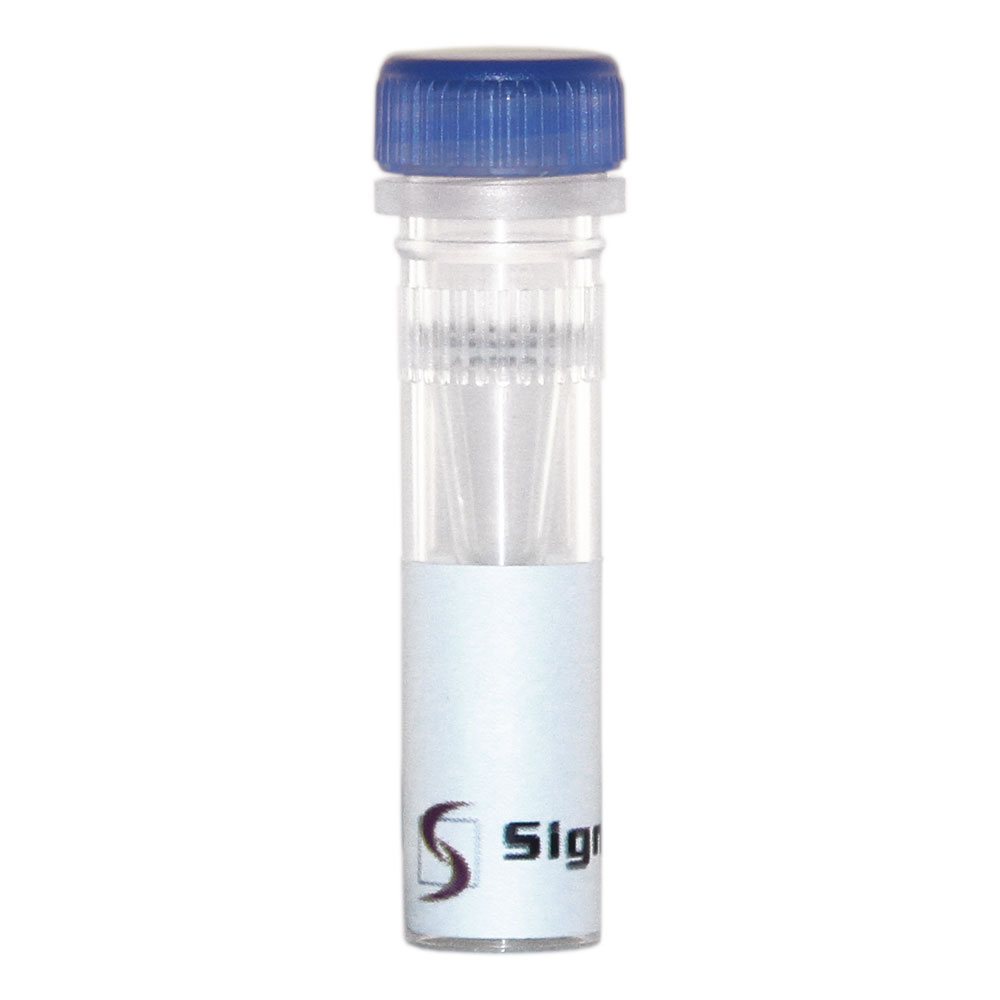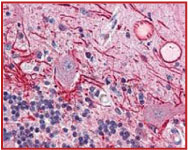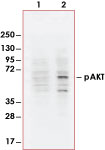
Anti-phospho-AKT1/2/3 (Thr308)
Mouse Monoclonal Antibody
Catalog No. A16-65M
| Catalog No. | Pack Size | Price (USD) | |
|---|---|---|---|
| A16-65M-100 | 100 ug | $675 | |
| A16-65M-BULK | BULK | Contact Us |

Mouse Monoclonal Antibody
Catalog No. A16-65M
| Catalog No. | Pack Size | Price (USD) | |
|---|---|---|---|
| A16-65M-100 | 100 ug | $675 | |
| A16-65M-BULK | BULK | Contact Us |
Overview:
AKT1/PKBα is a serine/threonine kinase that belongs to the AKT family. AKT1 is activated in cells in response to diverse stimuli such as hormones, growth factors and extracellular matrix components and is involved in glucose metabolism, transcription, survival, cell proliferation, angiogenesis, and cell motility (1). AKT1 is frequently overexpressed and active in many types of human cancers including cancers of colon, breast, brain, pancreas and prostate as well as lymphomas and leukemias (2).
References:
1. Coffer, PJ. et al: Protein kinase B (c-Akt): a multifunctional mediator of phosphatidylinositol 3-kinase activation. Biochem J. 1998 Oct 1; 335 ( Pt 1):1-13.
2. Anderson, KE. et al: Translocation of PDK-1 to the plasma membrane is important in allowing PDK-1 to activate protein kinase B. Curr Biol. 1998 Jun 4;8(12): 684-91.
Specificity:
Recognizes the AKT protein phosphorylated at Threonine 308.
Cross Reactivity:
Human, Mouse, Rat and Monkey
Host Isotype / Clone#:
Mouse, IgG
Immunogen:
The antibody was produced against synthesized peptide corresponding to residues surrounding Thr 308 of Human AKT1 protein.
Purification:
Protein A Chromatography
Stability:
1yr at –20oC from date of shipment
Sample Data:
Immunohistochemical analysis of formalin fixed, paraffin embedded human brain cerebellum tissue (40x) using Anti-Phospho-ATK1/2/3 (Thr308)

|
Sample Data:
Western Blot of Anti-Phospho-AKT1/2/3 (Thr308) (1:4,000). Lane 1: non-phosphorylated AKT in untreated cells . Lane 2: phosphorylated AKT on PDGF stimulated NIH/3T3 cell lysates . Load: 15 µg per lane.

|
![]() Ghosh Dastidar Somasish et al., FoxG1 Promotes the Survival of Postmitotic Neurons Journal of Neuroscience January 2011 10.1523/JNEUROSCI.2897-10.2011
Ghosh Dastidar Somasish et al., FoxG1 Promotes the Survival of Postmitotic Neurons Journal of Neuroscience January 2011 10.1523/JNEUROSCI.2897-10.2011
![]() Cena Bo et al., The Pim-1 protein kinase is an important regulator of MET receptor tyrosine kinase levels and signaling Molecular and Cellular Biology March 2014 10.1128/MCB.00147-14
Cena Bo et al., The Pim-1 protein kinase is an important regulator of MET receptor tyrosine kinase levels and signaling Molecular and Cellular Biology March 2014 10.1128/MCB.00147-14
![]() Lamouille Samy et al., TGF-?-induced activation of mTOR complex 2 drives epithelial?mesenchymal transition and cell invasion Journal of Cell Science March 2012 10.1242/jcs.095299
Lamouille Samy et al., TGF-?-induced activation of mTOR complex 2 drives epithelial?mesenchymal transition and cell invasion Journal of Cell Science March 2012 10.1242/jcs.095299
![]() Zenga in et al., Lanthionine synthetase C-like protein 2 (LanCL2) is a novel regulator of Akt Molecular Biology of the Cell September 2014 10.1091/mbc.E14-01-0004
Zenga in et al., Lanthionine synthetase C-like protein 2 (LanCL2) is a novel regulator of Akt Molecular Biology of the Cell September 2014 10.1091/mbc.E14-01-0004
![]() Cennia Vittoria et al., Ankrd2/ARPP is a novel Akt2 specific substrate and regulates myogenic differentiation upon cellular exposure to H2O2 Molecular Biology of the Cell July 2011 10.1091/mbc.E10-11-0928
Cennia Vittoria et al., Ankrd2/ARPP is a novel Akt2 specific substrate and regulates myogenic differentiation upon cellular exposure to H2O2 Molecular Biology of the Cell July 2011 10.1091/mbc.E10-11-0928
![]() Ling Dai Chun et al., Inhibition of Protein Synthesis Alters Protein Degradation through Activation of Protein Kinase B (AKT) Journal of Biological Chemistry July 2013 10.1074/jbc.M112.445148
Ling Dai Chun et al., Inhibition of Protein Synthesis Alters Protein Degradation through Activation of Protein Kinase B (AKT) Journal of Biological Chemistry July 2013 10.1074/jbc.M112.445148
![]() Bavelloni Alberto et al., Prohibitin 2 represents a novel nuclear AKT substrate during all-trans retinoic acid-induced differentiation of acute promyelocytic leukemia cells FASEB Journal February 2014 10.1096/fj.13-244368
Bavelloni Alberto et al., Prohibitin 2 represents a novel nuclear AKT substrate during all-trans retinoic acid-induced differentiation of acute promyelocytic leukemia cells FASEB Journal February 2014 10.1096/fj.13-244368
![]() Pecorari Luisa et al., Elongation Factor 1 alpha interacts with phospho-Akt in breast cancer cells and regulates their proliferation, survival and motility Molecular Cancer August 2009 10.1186/1476-4598-8-58
Pecorari Luisa et al., Elongation Factor 1 alpha interacts with phospho-Akt in breast cancer cells and regulates their proliferation, survival and motility Molecular Cancer August 2009 10.1186/1476-4598-8-58
![]() M. Singel Stina et al., KIF14 Promotes AKT Phosphorylation and Contributes to Chemoresistance in Triple-Negative Breast Cancer Neoplasia March 2014 10.1016/j.neo.2014.03.008
M. Singel Stina et al., KIF14 Promotes AKT Phosphorylation and Contributes to Chemoresistance in Triple-Negative Breast Cancer Neoplasia March 2014 10.1016/j.neo.2014.03.008
![]() Treebak Jonas et al., Identification of a novel phosphorylation site on TBC1D4 regulated by AMP-activated protein kinase in skeletal muscle American Journal of Physiology - Cell Physiology November 2009 10.1152/ajpcell.00297.2009
Treebak Jonas et al., Identification of a novel phosphorylation site on TBC1D4 regulated by AMP-activated protein kinase in skeletal muscle American Journal of Physiology - Cell Physiology November 2009 10.1152/ajpcell.00297.2009
![]() SC Stolze et al., Photo-crosslinking of clinically relevant kinases using H89-derived photo-affinity probes Molecular BioSystems May 2016 10.1039/c6mb00257a
SC Stolze et al., Photo-crosslinking of clinically relevant kinases using H89-derived photo-affinity probes Molecular BioSystems May 2016 10.1039/c6mb00257a
![]() Asakura Keisuke et al., The Cytostatic Effects of Lovastatin on ACC-MESO-1 Cells Journal of Surgical Research October 2011 10.1016/j.jss.2011.06.037
Asakura Keisuke et al., The Cytostatic Effects of Lovastatin on ACC-MESO-1 Cells Journal of Surgical Research October 2011 10.1016/j.jss.2011.06.037
AKT/PKB Pathway, Angiogenesis, Apoptosis/Autophagy, Cancer, Cardiovascular Disease, Inflammation, Invasion/Metastasis, Metabolic Disorder, Neurobiology, NfkB Pathway, WNT Signaling
STAY CONNECTED
Fax: 1-604-232-4601